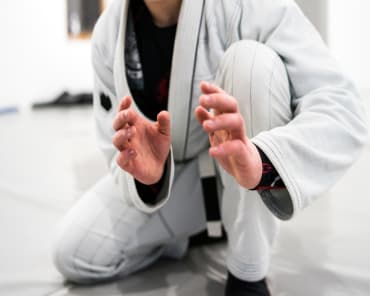In the world of Brazilian Jiu-Jitsu (BJJ), the coveted black belt is not just a symbol of technical mastery but a profound testament to a practitioner's journey, character, and commitment to the art. Becoming a BJJ black belt is an achievement that transcends the physical techniques learned on the mats. This blog delves into the deeper meaning of being a BJJ black belt, exploring the qualities, responsibilities, and ethos that accompany this prestigious rank.
1. Mastery of Technique and Knowledge
At its core, a BJJ black belt signifies a mastery of technique and knowledge. It is the culmination of years of dedicated training, countless hours on the mats, and a comprehensive understanding of the art's intricate principles. Black belts possess a deep repertoire of techniques, transitions, and strategies, showcasing a level of technical proficiency that sets them apart.
2. Lifelong Learning and Humility
Contrary to the misconception that achieving a black belt denotes the end of the journey, it signifies a commitment to lifelong learning and humility. Black belts recognize that there is always room for improvement and growth. They continue to seek knowledge, refine their skills, and remain open to learning from practitioners of all ranks, embodying the humble spirit that characterizes the BJJ community.
3. Mentorship and Leadership
A BJJ black belt assumes a role of mentorship and leadership within the academy. They guide lower-ranked practitioners, offering insights, corrections, and encouragement. Black belts foster a positive and supportive training environment, inspiring others to navigate their own journeys with resilience and dedication. Mentorship is a cornerstone of the black belt's responsibilities.
4. Resilience in the Face of Challenges
The journey to a black belt is marked by numerous challenges – physical, mental, and emotional. Black belts exemplify resilience in the face of setbacks, injuries, and the inevitable obstacles that arise. Their ability to persevere through challenges becomes a source of inspiration for the entire BJJ community, demonstrating that setbacks are opportunities for growth.
5. Contribution to the BJJ Community
Black belts contribute significantly to the BJJ community beyond their personal achievements. They organize seminars, share their knowledge through teaching, and actively participate in the growth of the art. Whether it's mentoring lower-ranked practitioners or contributing to the broader BJJ community, black belts play a pivotal role in fostering a culture of continuous learning and collaboration.
6. Ambassadorship of BJJ Values
Being a BJJ black belt is synonymous with embodying the core values of the art – respect, discipline, and sportsmanship. Black belts serve as ambassadors of these values, both on and off the mats. Their conduct reflects the principles of integrity, humility, and camaraderie that define the BJJ community. Black belts set the standard for ethical behavior and inspire others to uphold these values.
7. Adapting Techniques for All Levels
Black belts possess the ability to adapt their techniques for practitioners of all levels. They can tailor their approach to accommodate the unique challenges faced by white belts while providing advanced insights for higher-ranked individuals. This adaptability showcases not only technical mastery but also a deep understanding of the learning needs of practitioners at different stages of their BJJ journey.
8. Continuous Self-Reflection
Achieving a black belt is not the end of self-improvement; it marks the beginning of a phase of continuous self-reflection. Black belts regularly assess their own progress, identify areas for refinement, and set new goals for personal development. This commitment to self-reflection contributes to the ongoing evolution of their skills and mindset.
9. Representing the Legacy of BJJ
Black belts are the custodians of the rich legacy and tradition of BJJ. They carry forward the teachings of their instructors, contributing to the lineage of the art. As representatives of the BJJ legacy, black belts have a responsibility to preserve the authenticity of the techniques and principles while adapting to the evolving landscape of the martial art.
10. Passing on the Torch
Ultimately, a BJJ black belt sees their journey as part of a broader legacy. They play a pivotal role in passing on the torch to the next generation of practitioners. Through mentorship, leadership, and active participation in the community, black belts contribute to the sustainability and growth of BJJ, ensuring that the art continues to thrive for years to come.
In conclusion, being a BJJ black belt extends beyond the acquisition of technical expertise; it encompasses mentorship, leadership, humility, and a commitment to the values of the art. Black belts are not just skilled practitioners; they are ambassadors of a legacy, contributing to the community's growth and inspiring others on their own journeys. The essence of being a BJJ black belt lies in the continuous pursuit of excellence, a dedication to lifelong learning, and the profound impact they have on the BJJ community.






